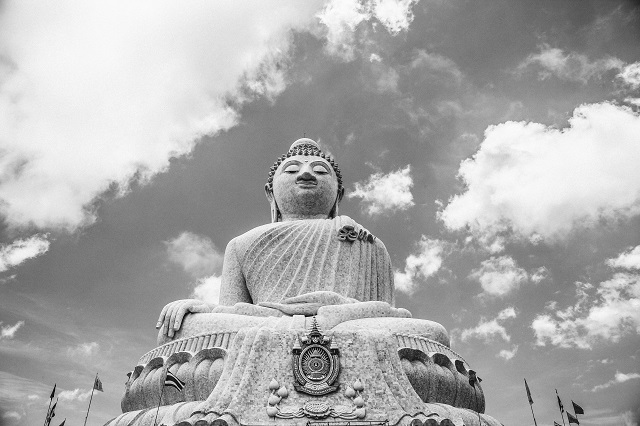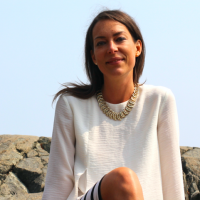If there is an ideal way to live, most likely, Buddha would have been the one who could have shown us what it is.
Not because he was perfect; he wasn’t. He did not live a life that was free of indulgence, greed, mistakes, or fear—nor was his life absent of struggle. No, Buddha—or the man he was before he became the Buddha (Siddhartha Gautama)—was very human, and he displayed many imperfect qualities.
However, one day, this very imperfect human, decided to wake up.
He chose something that many of us wish we could. Siddhartha made the decision to live a different life than the one he was born into.
The privileged (but claustrophobic) life he had been living—in a palace, with servants—he abandoned. Buddha, instead, decided he wanted to be free from the causes of suffering.
Perhaps this is what many of us are craving currently. We are aching inside for the experience to live as we truly want to. However, sometimes, we don’t even know what this means anymore. Often, we don’t believe we have the right to live it either.
Freedom…what is that, really? We have gotten so used to not feeling this way.
The adoption of societal rules, cultural norms, other people’s ideas about who and what we ought to be, our work responsibilities, home-life “necessities,” and even of our social commitments all affect us.
Often, it is these potentially beautiful things that place a weight on our chest, waking us up each morning to an experience of fear and constriction, rather than joy and expansion.
So, how could this be different? How could we wake up instead with a light chest and evolving heart? Is there a way to be in this life, with all our responsibilities, and know the spark of limitless possibilities—the one the Buddha decided to reach out to?
Perhaps it is about recalling something we have forgotten. Maybe it is similar to knowing again that curiosity and energy that as children we harnessed so easily.
I—and, most likely, the Buddha—believe so.
The Dalai Lama says in his book, The Joy of Living and Dying, that “even in ordinary life, we have to persevere if we are to achieve anything.”
It is this perseverance that could be what leads to our freedom. It is the commitment to getting back to the lightness that we once held. This is done not by changing who we are at our core, but it’s actually about remembering what we honestly came here to do.
This happened for me recently. This weekend, I visited a farm I had spent time at as a child. It was a place where I felt completely free. It was a place where I and three other girls dreamed our best selves into being—and we played while doing so.
We were wild, and we were unabashedly—ourselves.
There, we spent hours playing hide and seek in tall fields of grass, and at night, we slept out on the porch and listened to the coyotes howl.
On that porch, we decided how we were going to live our next day. For us, then, it was hunting wild mushrooms, swimming in the watering hole out back, and choreographing shows to preform for our family after we cooked them dinner.
We were children who lived. We were humans who felt fully alive.
Going back there this weekend, I wept.
I slept for a night amongst the fields of dry grass, under a full moon, and I barely dreamed—for I was remembering all that we were then, and all that had happened for each of us since.
It felt profound to be there. It felt immense. It seemed…huge. And what I came to feel as I walked around the property the next morning was that this life is, in fact, huge.
We forget this.
We begin to believe life is small and limited, and we think we are this too. But, the Buddha would disagree. He would tell us that if we are suffering—take a risk, and be more.
In Buddhism, it is believed that perseverance is what advances us to the most positive direction, benefit, brightness, and joy.
“Do something different,” the Buddha would say. “Lean into what we truly desire. Embrace what our heart aches for.”
Returning to the farm this weekend reminded me of the untamed places of our souls, where there resides a light—the one, as children, we knew so well.
As a man, Siddhartha hadn’t thought he would reach an enlightened state of bliss. No, he just tried.
Again and again, he sought teachers and journeys, and he didn’t simply say yes to what didn’t feel right. He did this, because he too had woken up with a weight on his chest one day, and he didn’t want this to be so.
Dedication to joy is what we knew as children. It is this commitment that we need to know in order to awaken to the life we’ve forgotten we once dreamed.
It is profound and brave to choose something different than we have been living, something closer to our original truth.
Our souls know they came here with purpose—this purpose is something free.
Allowing ourselves to feel this weight we wake up to will then allow us to release it.
The Buddha knew that to overcome our suffering, we simply need to try.
So carry on—even if, at this moment, things are heavy—for as we persevere, we will discover what is beneath that weight.
Right here, right now—we can experience the life we’ve dreamed about. Buddha would teach us this, certainly.
~
Relephant:
Buddhas Before the Buddha?
~
Author: Sarah Norrad
Image: Flickr/Anthony DELANOIX
Editor: Yoli Ramazzina
Copy editor: Travis May
Social editor: Taia Butler


 Share on bsky
Share on bsky





Read 5 comments and reply